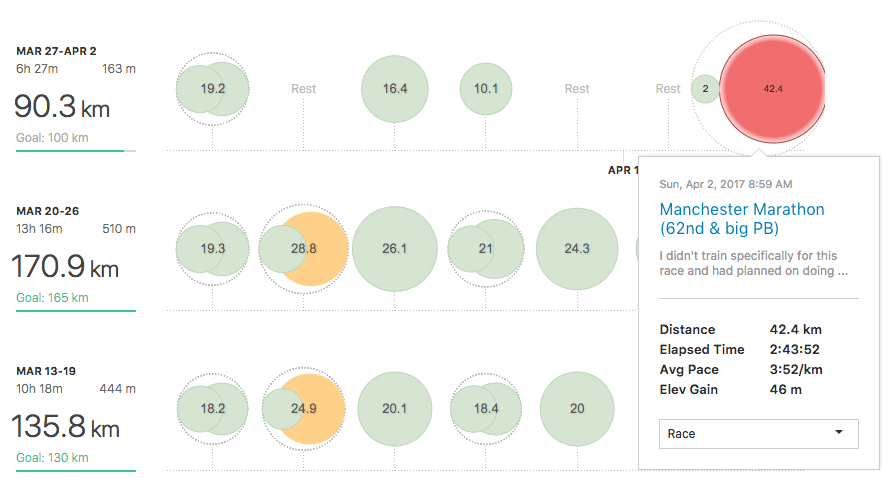Does High Mileage Result in Faster Marathon Times?
Jason Fitzgerald over at Strength Running posted an interesting article today, How Much Mileage Should You Run During Marathon Training? that emphasises a great point:
Every day, I get questions from my readers about the marathon:
- “Should I take a gel every 4 miles or every 3 miles during the race?”
- “What brand of salt stick do you recommend?”
- “Should I race in compression socks?
But the most important factor that affects how well you’ll race is not any of the above issues.
It’s how much weekly mileage you’re capable of running.
The principle is simple: run more and you’ll race faster.
He goes on to include stats and make two vital points:
- Running more helps you race faster
- Running easy is critical for balance.
… and I couldn't agree more. I wrote a quick response in the post, but thought I'd expand a bit more here.
I'd heard this sage advice for years but never acted upon it. Why would I? I was doing well on my 60-100km per week training, loaded with interval sessions and tempo runs, and was posting some pretty decent times so didn't feel the need to change anything. It was only after more reading, researching, more maturity and an increased desire to improve my times that I started experimenting with upping my mileage instead of intensity, and quite considerably.
So did it work? What do you think?
In 2015 I ran about 60-100km per week with a lot of tempo and interval work and set a marathon PB of 2:53:34 - my first ever sub-3 marathon. In 2016 I upped my peak training to 110-140km a week, cut down on the tempo and intervals a bit, blew up at Berlin, zipped up my Yuki suit, and pulled my PB down to 2:47:31. This year I upped my peak training to 130-170km a week (whilst training for the Comrades ultra-marathon), cut the tempos and intervals even more, and smashed out a new PB of 2:43:39 the week after a 170km training week.

I've set new PBs in all distances except 5K and 5M (I've not really raced these this year) off this training which was roughly following the 80/20 principal (it was closer to 85/15) with all of the low intensity being done at or below MAF. Using MAF as my go-to strategy meant I was able to increase my mileage quite significantly without putting too much strain on my body. MAF is also a perfect pace limiter and forces me to run easy and well within my capabilities.
So yes, I think I can definitely say this works and I'll be using a similar approach for next year's London marathon (should be getting a championship start 🤞) and Comrades ultra-marathon with a bit more emphasis on the high intensity and strength side of things to bring things back down closer to the 80/20 ratio and prepare my body for the beating the Comrades "down run" is going to dish out to me.